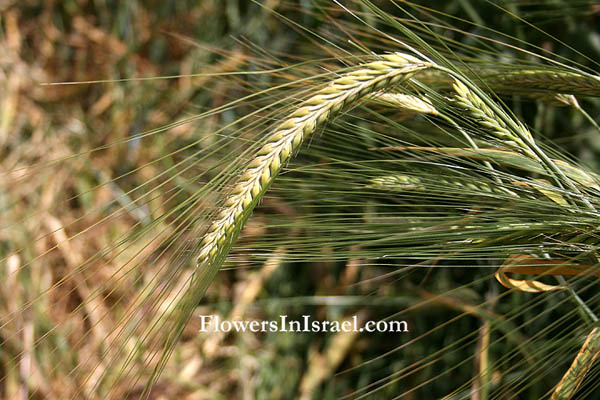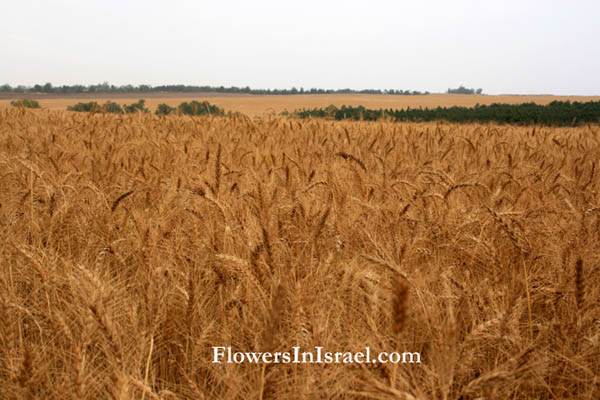
Derivation of the botanical name:
Triticum, the classical Latin name for wheat.
aestivum, Aestas, summer; of summer, pertaining to summer.
The Hebrew Name: Chita חיטה - "wheat" probably derives from the root חנט, meaning "to ripen".
- The standard author abbreviation L. is used to indicate Carl Linnaeus (1707 – 1778), a Swedish botanist, physician, and zoologist, the father of modern taxonomy.
Triticum aestivum L. is a hexaploid species that is the most widely cultivated in the world and it is the “wheat” of the Bible.
Throughout time, wheat has been the most important food plant in human life. Mark Nesbitt (2005) stated that the earliest
domestication of wheat goes back 9500 to 9200 years to Neolithic sites in Syria, Jordan, and Southeast Turkey. Zohary et al. (2012) also stated that wheat has been the primary agricultural element in the Old World from Neolithic times to the present.
See the list of Medicinal herbs in Israel, the parts used and their medical uses to treat various diseases.
The annual Biblical Holy Days are directly related to produce harvests from the land of Israel.
The barley harvest (Passover; Exodus 9:31,32) occurred in April-May.
About seven weeks later, the wheat harvest (Pentecost; Exodus 34:22; Judges 15:1; 1 Samuel 12:17) occurred in June-July.
- Celebrate the Feast of Weeks with the first fruits of the wheat harvest, and the Feast of Ingathering at the turn of the year.
Exodus 34:22
- Samson's Vengeance on the Philistines
Later on, at the time of wheat harvest, Samson took a young goat and went to visit his wife. He said, "I'm going to my wife's room." But her father would not let him go in.
Judges 15:1
- Is it not wheat harvest now? I will call upon the LORD to send thunder and rain. And you will realize what an evil thing you did in the eyes of the LORD when you asked for a king."
1 Samuel 12:17
The autumn fruit harvest from the trees and vines (the Feast of Tabernacles; Leviticus 23:39-41) took place in September-October.
Bible resources:
- Genesis 30:14
During wheat harvest, Reuben went out into the fields and found some mandrake plants, which he brought to his mother Leah. Rachel said to Leah, “Please give me some of your son’s mandrakes.”
- Exodus 9:32
The wheat and spelt, however, were not destroyed, because they ripen later.)
- Exodus 29:2
And from the finest wheat flour make round loaves without yeast, thick loaves without yeast and with olive oil mixed in, and thin loaves without yeast and brushed with olive oil.
- Exodus 34:22
“Celebrate the Festival of Weeks with the firstfruits of the wheat harvest, and the Festival of Ingathering at the turn of the year.
- Deuteronomy 8:8
a land with wheat and barley, vines and fig trees, pomegranates, olive oil and honey;
- Deuteronomy 32:14
with curds and milk from herd and flock and with fattened lambs and goats, with choice rams of Bashan and the finest kernels of wheat. You drank the foaming blood of the grape.
- Judges 6:11
The angel of the LORD came and sat down under the oak in Ophrah that belonged to Joash the Abiezrite, where his son Gideon was threshing wheat in a winepress to keep it from the Midianites.
- Judges 15:1
[ Samson’s Vengeance on the Philistines ] Later on, at the time of wheat harvest, Samson took a young goat and went to visit his wife. He said, “I’m going to my wife’s room.” But her father would not let him go in.
- Ruth 2:23
So Ruth stayed close to the women of Boaz to glean until the barley and wheat harvests were finished. And she lived with her mother-in-law.
- 1 Samuel 6:13
Now the people of Beth Shemesh were harvesting their wheat in the valley, and when they looked up and saw the ark, they rejoiced at the sight.
- 1 Samuel 12:17
Is it not wheat harvest now? I will call on the LORD to send thunder and rain. And you will realize what an evil thing you did in the eyes of the LORD when you asked for a king.”
- 2 Samuel 4:6
They went into the inner part of the house as if to get some wheat, and they stabbed him in the stomach. Then Rekab and his brother Baanah slipped away.
- 2 Samuel 17:28
brought bedding and bowls and articles of pottery. They also brought wheat and barley, flour and roasted grain, beans and lentils,
- 1 Kings 5:11
and Solomon gave Hiram twenty thousand cors of wheat as food for his household, in addition to twenty thousand baths of pressed olive oil. Solomon continued to do this for Hiram year after year.
- 1 Chronicles 21:20
While Araunah was threshing wheat, he turned and saw the angel; his four sons who were with him hid themselves.
- 1 Chronicles 21:23
Araunah said to David, “Take it! Let my lord the king do whatever pleases him. Look, I will give the oxen for the burnt offerings, the threshing sledges for the wood, and the wheat for the grain offering. I will give all this.”
- 2 Chronicles 2:10
I will give your servants, the woodsmen who cut the timber, twenty thousand cors of ground wheat, twenty thousand cors of barley, twenty thousand baths of wine and twenty thousand baths of olive oil.”
- 2 Chronicles 2:15
“Now let my lord send his servants the wheat and barley and the olive oil and wine he promised,
- 2 Chronicles 27:5
Jotham waged war against the king of the Ammonites and conquered them. That year the Ammonites paid him a hundred talents of silver, ten thousand cors of wheat and ten thousand cors of barley. The Ammonites brought him the same amount also in the second and third years.
- Ezra 6:9
Whatever is needed—young bulls, rams, male lambs for burnt offerings to the God of heaven, and wheat, salt, wine and olive oil, as requested by the priests in Jerusalem—must be given them daily without fail,
- Ezra 7:22
up to a hundred talents of silver, a hundred cors of wheat, a hundred baths of wine, a hundred baths of olive oil, and salt without limit.
- Job 31:40
then let briers come up instead of wheat and stinkweed instead of barley.” The words of Job are ended.
- Psalm 81:16
But you would be fed with the finest of wheat; with honey from the rock I would satisfy you.”
- Psalm 147:14
He grants peace to your borders and satisfies you with the finest of wheat.
- Song of Solomon 7:2
Your navel is a rounded goblet that never lacks blended wine. Your waist is a mound of wheat encircled by lilies.
|

